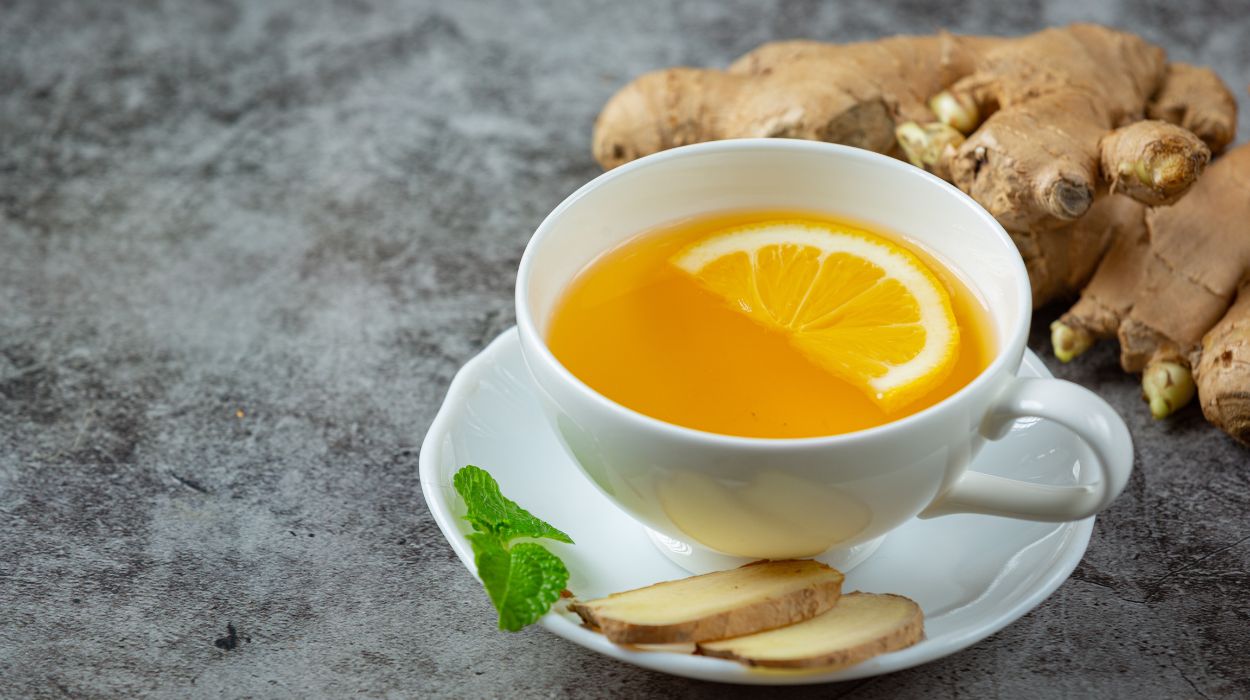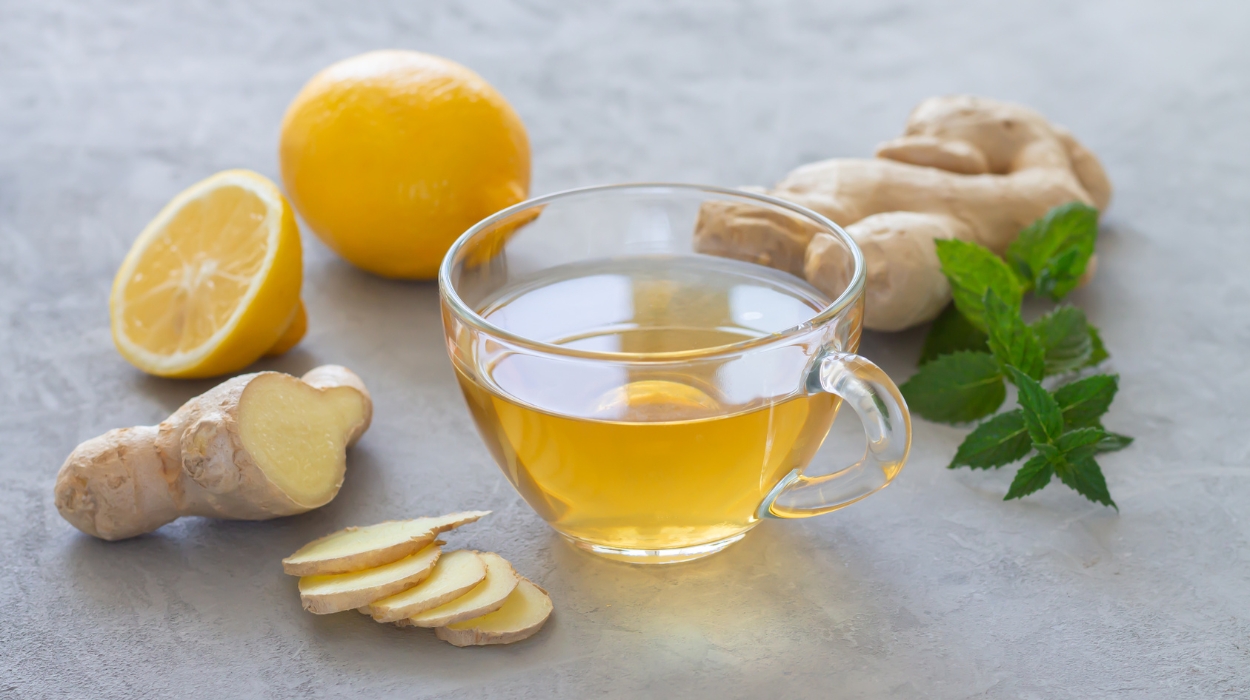Ginger is a knobby, aromatic root that comes from the Zingiber officinale plant. The root is prized for its culinary uses and taste in food dishes and beverages. But, do its benefits extend from our palates to our waistlines?
Studies show that ginger may improve mechanisms that support weight loss.[1] The findings suggest ginger consumption enhances thermogenesis, controls appetite, and improves the breakdown of fats. It also may prevent the absorption of fat in the intestines.
Let’s find out more about ginger tea for weight loss below.
Does Ginger Tea Make You Lose Weight?
Yes, it can. Studies show that the compounds in ginger stimulate fat breakdown and boost metabolism. They also encourage feelings of fullness, reduce inflammation, and improve metabolic function, further supporting weight loss.
Drinking ginger tea alone does not lead to weight loss. It needs to be paired with exercise and a balanced diet, before meals or in the morning. Remember moderation is key to avoid potential side effects, and caution should be used if you have specific allergies or health conditions or are on medications.
Is Ginger Tea Good For Weight Loss?

Whether ginger tea makes you lose weight has long been a discussion. Over the years, the evidence from scientific studies is that ginger may support weight management.
The body has two types of fat: white fat, which stores energy, and brown fat, which burns calories. When white fat turns into brown fat, it becomes more active and burns calories to generate heat.
Studies show that active compounds like gingerol[2] can stimulate the browning of white fat tissue, thus increasing metabolism. Boosting metabolism means increasing the body’s engine which burns calories for energy.
With an increased metabolism, the body burns more calories, even when we’re not actively moving. This helps create a cycle where the body uses stored fat for energy, reducing the fat stored in one’s body over time.
So, ginger helps turn fat-storing cells into fat-burning ones. Research also shows that ginger supports weight loss[3] through other mechanisms of action as well. This includes promoting feelings of fullness and reducing inflammation.[4]
Fullness means you don’t feel hungry and consume excess calories. Reduced inflammation supports weight loss by improving metabolism. Improved metabolic and hormonal parameters lead to managed cholesterol levels and regulated blood sugar levels.
So, to answer the question, is ginger good for weight loss, yes, it is, and it may help achieve weight loss goals faster. But similar to other weight loss aids like fat burners, individual results may vary.
How To Lose Weight With Ginger Tea?
Next to the classic diet pill, weight loss drinks emerge as one of the most effective ways to eliminate excess weight. However, it isn’t a stand-alone solution. The tea must be paired with an exercise routine and a balanced diet.
Regular physical activity is crucial. Choose exercise routines that are enjoyable to ensure you keep doing them consistently. Focus on maintaining a balanced diet with a variety of nutritious foods and control portion sizes.
If you are craving sugary drinks such as sodas, opt for ginger tea instead as it’s lower calorie and better for your health. Choose healthy snacks, be mindful of your eating habits, and avoid processed foods and excessive sugars.
Remember that weight loss is a gradual process, so be consistent with your healthy diet, exercise habits, and ginger consumption.
What Do Studies Say About Using Ginger Tea For Weight Loss?
The effectiveness of a ginger drink for weight loss was demonstrated in a comprehensive study that involved two groups. One group consumed ginger water[5] and the other did not. The results revealed a significant reduction in body weight gain in the ginger water group compared to the other group.
The ginger group also had a decrease in cholesterol and triacylglycerol levels. A decrease in triacylglycerol levels can reduce fat storage. This improves metabolic health and helps with weight loss and management.
The study also explored gene expression. It showed that ginger water decreased the expression of genes associated with fat accumulation, appetite, and feelings of fullness. In contrast, it increased gene expression related to fat breakdown, glucose metabolism, and lipid oxidation.
When To Consume Ginger Tea For Weight Loss?
To optimize weight loss benefits, consume ginger tea strategically throughout the day. Start with a cup in the morning as soon as you wake. You can follow that with another cup before lunch or dinner.
This can improve your metabolism and promote feelings of fullness,[6] so you burn more calories than you eat. Creating a calorie deficit[7] can support weight loss. Also, consider having a cup in the afternoon to maintain energy levels and control snacking urges.
The thermogenic properties[8] of ginger may enhance calorie burning, making it a suitable choice pre-workout as well. Ultimately, incorporating ginger tea into your daily routine with a healthy diet and regular exercise can contribute to effective and sustainable weight loss.
How To Make Ginger Tea For Weight Loss

The ingredients and method to make this weight loss concoction are quite accessible and affordable. Most of the things you need are sitting right in your pantry. Below is a list of ingredients and methods for making ginger tea.
Ingredients
- Boiled water.
- Ginger.
- Tea bags (black tea, green tea, or herbal tea of your choice).
Method
To concoct a potent weight-loss ginger tea, you need to decide on the form of ginger you want to use. You can opt for dried ginger powder, grated ginger, or fresh ginger slices for your brew. You can also use ground ginger, pieces of ginger root, or ginger juice.
Begin by bringing water to a boil in a pot or pan. Add tea bags into the pot along with your ginger element. Continuously stir the mix and allow the tea to simmer. After simmering, you can take the tea off the heat.
Let the mixture steep for five minutes for a strong blend. This allows the flavors to intertwine as the tea cools. If you use a form of ginger that cannot be dissolved, strain your tea using a strainer.
You can also stir in a small bit of ginger extract to intensify the brew’s potency if your tummy can handle it. To balance the flavors and add a vitamin C boost, squeeze in some fresh lemon juice. You may add honey and apple cider vinegar to the mix as well, which will further support weight loss.
Side Effects And Precautions
The weight loss properties linked to ginger may help you get rid of those excess pounds, but this doesn’t come without caution. Ginger is generally safe for most people to use for weight loss.
There isn’t a set recommendation for how much ginger tea we should be consuming daily. However, studies do provide a rough guideline for ginger consumption on its own. Several studies found that lower doses of ginger were ineffective against metabolic issues like obesity.
They show that effective ginger doses range from 750-1500 mg daily.[9] This was in the form of ginger supplements or ginger extract. This amount of ginger would translate to about 4-5 cups of ginger tea, with each cup being 237ml-250ml.
Going over the 5-cup mark or the recommendation guideline may result in you experiencing side effects like gas, bloating, heartburn, nausea, diarrhea, and abdominal pain. You should also be cautious of your ginger intake if you are:
- Pregnant.
- Scheduled for surgery.
- Experiencing allergies to ginger compounds.
- Suffering from medical conditions like bleeding disorders or gallstones.
- Taking blood pressure medications or supplements that contain ingredients that interact with ginger.
Other Health Benefits Of Ginger Tea
There is a large body of scientific evidence supporting the other beneficial effects of ginger. So, besides using ginger for weight loss, you can also use it to improve your overall health. Some of the other health benefits of consuming ginger[9] include:
- Alleviates specific types of pain.[10]
- Lowers risks of certain cancers.[11]
- Sustains a better functioning immune system.[12]
- Supports cardiovascular health[13] and decreases heart disease.
- Combats gastrointestinal issues,[14] reduces gas,[14] improves digestion and gut health, prevents constipation, and helps with nausea and vomiting.
Conclusion
If you’re still wondering, does ginger tea help with weight loss? The active compounds in ginger root present a triple threat, boosting metabolism, curbing large appetites, and enhancing metabolic factors to improve fat burning.
This comes along with other beneficial effects like supporting fat breakdown and the use of fat for energy. Remember, ginger tea only supports weight loss, not fully causing it. It needs to be accompanied by an overall healthy lifestyle, including regular workouts and a balanced diet.
Beyond weight loss, ginger also provides a host of health benefits, making it a versatile addition to a healthy lifestyle. But remember, the results of weight loss vary between individuals.
Frequently Asked Questions
Ginger tea can be consumed in the morning to boost your metabolism. You can also have it before meals to reduce appetites and create longer feelings of fullness. For an extra calorie burn, consume the tea before workouts as well.
Yes, it is. The daily consumption of ginger tea offers numerous health benefits. It supports digestion, reduces inflammation, and boosts the immune system. Its antioxidant and anti-inflammatory properties contribute to overall well-being, making it a healthy choice for regular consumption.
Yes, drinking ginger tea before bed may aid weight loss. Its metabolism-boosting effects and ability to regulate blood sugar levels can promote fat burning during sleep. However, moderation is key to avoid disrupting sleep patterns.
This depends on the source of ginger. If it’s fresh ginger, consuming 5 grams daily is a safe and effective dose. You can get this dose through ginger tea, supplements, or incorporating ginger into meals.
 Evidence Based
Evidence Based

